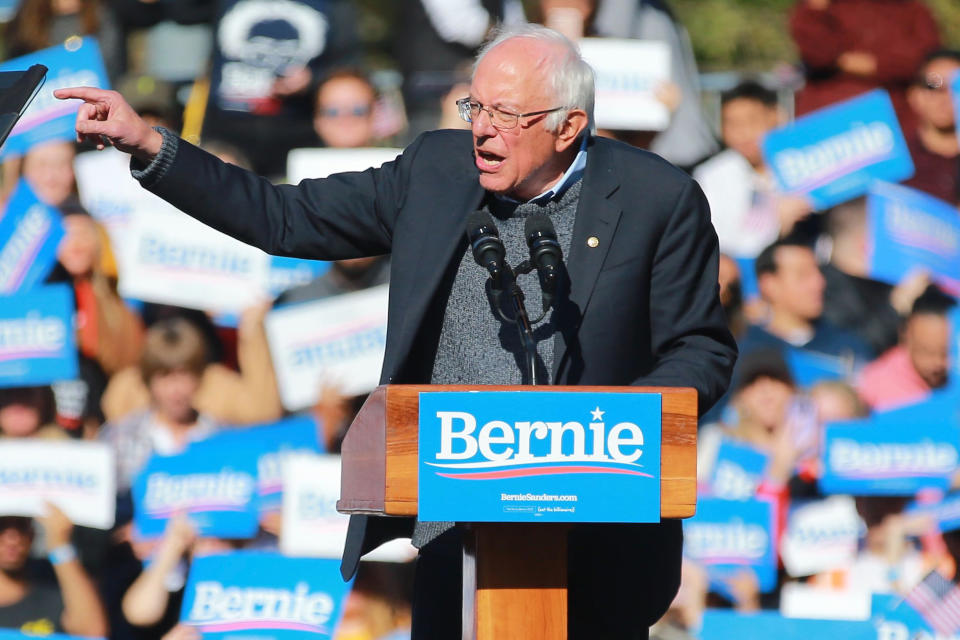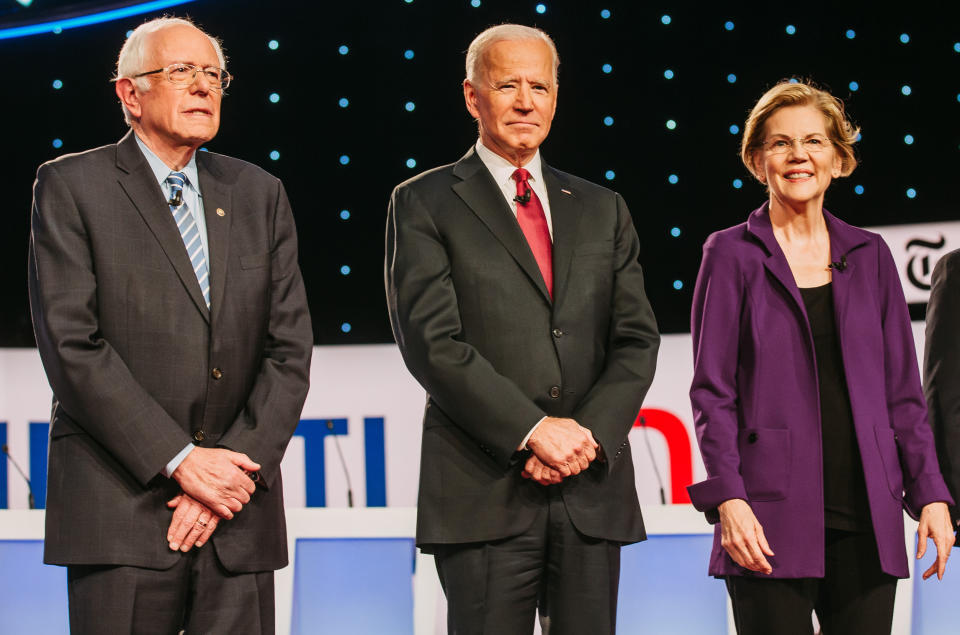Sanders is back, but the real beneficiary could be Biden
Welcome to 2020 Vision, the Yahoo News column covering the presidential race with one key takeaway every weekday and a wrap-up each weekend. Reminder: There are 102 days until the Iowa caucuses and 376 days until the 2020 election.
Could Bernie Sanders win the Democratic presidential nomination … for Joe Biden?
In the wake of his heart attack earlier in October, observers questioned whether the Vermont senator had the strength and stamina to continue his campaign. They wondered whether his supporters, citing concerns about his health, age (78) and ability to defeat Donald Trump, might abandon ship. And they predicted that, along with a declining Biden, a weakened Sanders would put Elizabeth Warren on a glide path to the nomination.
Not so much.
Far from fading away, Sanders has actually gained ground in the RealClearPolitics national polling average since returning to the trail, climbing from a low of 14.3 percent after his hospitalization back to his pre-heart-attack average just above 17 percent. One new survey by Emerson College shows him gaining 3 points (to 25 percent) since September, passing Warren (at 21 percent) for second place and nipping at Biden’s heels.
As Sanders himself put it last Saturday during a 26,000-person rally in Queens, N.Y., “I am back,” and “more than ready — more ready than ever — to carry on with you on the epic struggle that we face today.”
This, of course, is good news for Bernie and his fans. But it may be bad news for his fellow left-winger Warren — and for the left in general.

The first reason is that despite lackluster debate performances and frequent stumbles on the trail — the latest involves criticizing Trump for describing impeachment as a “lynching,” though he used the same word in 1998 to describe Bill Clinton’s impeachment — Biden doesn’t actually seem be declining in the polls. Since plummeting from a post-announcement high of 40-plus percent last spring, his national average has basically oscillated within a narrow range of 26 to 30 percent. A new CNN survey puts the former vice president at 34 percent, up from 24 percent in September. In contrast, Warren and Sanders show no movement since September, trailing at 19 and 16 percent, respectively.
The math is fairly simple. The longer the left is divided between two strong candidates, the less support Biden needs to remain in the lead.
So why is it Sanders who risks playing the spoiler, and not Warren?
Because polls also show that Sanders has less room than Warren to increase his support and overtake Biden. According to political scientists Seth Masket and Dave Peterson, “One of the most notable features of this primary field is just how many people don’t want to see Sanders as the nominee even though he’s currently third in the national polls.” When Masket asked early-state Democratic activists who they don’t want the nominee to be, 59 percent said Sanders; only Tulsi Gabbard and Miramar, Fla., Mayor Wayne Messam attracted more opposition. And when Peterson asked the same question of likely Iowa caucus-goers in an Iowa State University/Civiqs poll, 25 percent said Sanders — the second-worst showing in the field. Among Iowans who didn’t back Sanders in 2016, meanwhile, less than 1 percent wanted to see him become the nominee in 2020, and a third specifically did not want to see him nominated. “The suggestion here is that Sanders is a factional candidate,” conclude Masket and Peterson. “A specific set of Democrats are very excited about him, but he has limited ability to expand that coalition into a broader base of support.” Case in point: Since Biden entered the race, Sanders has never cracked 19 percent in the RealClearPolitics national polling average.

Warren doesn’t have this problem. According to a new Ipsos/FiveThirtyEight poll, more supporters of Biden, Sanders, Pete Buttigieg and Kamala Harris are considering voting for Warren than for any other candidate. Among Biden supporters, for instance, 52.2 percent are also considering Warren; only 39.2 percent are considering Sanders. Among Harris supporters, those numbers are 69.1 percent and 40.6 percent, respectively. Among Buttigieg supporters, the gap between Warren and Sanders is even wider: 72 percent versus 32.3 percent. As a September YouGov/FairVote poll demonstrated, Warren would actually beat Biden if the rest of the field was eliminated and their supporters’ second-choice votes were allotted to the remaining candidates. In a three-way race, according to YouGov, Biden would lead Warren 39 to 38 percent, with Sanders lagging at 23 percent; once Sanders is eliminated, however, Warren would gain 15 points (to 53 percent) while Biden would gain only 8 (to 47 percent).
This isn’t an argument for Sanders to drop out. He has every right to keep running. He led the field in fundraising last quarter with an impressive $25.2 million. He has roughly as much cash on hand ($33.7 million) as Warren ($25.7 million) and Biden ($9 million) combined. His supporters are passionate. His last debate performance was strong. His rally in Queens was the biggest so far this cycle. And there is no national primary, so it may be that Iowa (where Sanders trails Warren and Biden by 6 or 7 points) and New Hampshire (where he trails Warren by more than 10 points) sort the field by themselves.
Still, as long as Biden stays aloft, Sanders’s return to the status quo does two things. One, it doesn’t get Sanders himself any closer to the nomination; for that he’d have to crack 20 or 25 percent in the polls. And two, it keeps Warren from getting closer to the nomination. We’ll see if Warren stumbles, or if Sanders finds another gear. But if not, there might be a reckoning down the road for progressives who’d rather not see Biden atop the ticket.
_____
Download the Yahoo News app to customize your experience.
Read more from Yahoo News:





